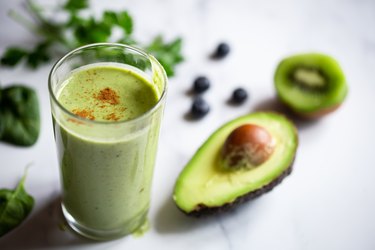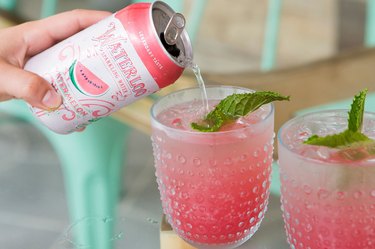
Inflammation can be both helpful and harmful. On one hand, it's your body's way of fighting infection and healing itself. But when in overdrive, it can become a hazard to your health, contributing to serious health conditions like heart disease, stroke and diabetes.
"In the simplest of terms, inflammation is our body's own [acute] stress-response mechanism that's activated to protect us from injury," Jaclyn London, RD, CDN, head of nutrition and wellness at WW, tells us.
Video of the Day
Video of the Day
However, chronic inflammation — low-grade activation of our body's own immune system over time as a result of exposure to harm — is much more insidious, London says. That's because this type of inflammation disrupts and degrades cells, causing tissue damage and, ultimately, organ breakdown.
While some cell degradation is associated with normal aging, our daily diet can increase inflammation. "Pro-inflammatory dietary patterns [such as eating too much saturated fat, added sugar and sodium] promote chronic inflammation through a cascade of biochemical reactions that push your body to work overtime to get its regular job done, which can cause damage to your cells over time," London says.
This also counts for what we drink — the liquid in your cup can exacerbate inflammation. To avoid this, try to limit or avoid these inflammatory drinks as much as possible.
1. Drinks With Added Sugar
Sugary beverages, which serve as the number one source of added sugar in the American diet, are considered pro-inflammatory, London says.
Here's why: "The more simple sugars (refined carbs) we consume, the more 'gunk' (byproducts) our bodies produce as a result of multiple metabolic responses," she says. This sets off a chain reaction that "can increase free radicals, which can be damaging to healthy tissues, and inflammation-promoting cytokines (proteins produced by our immune system, which can exacerbate the process of cellular damage)," she explains.
Unfortunately, there's added sugar lurking in many popular drinks, including:
- Regular soda
- Juices made with fruit concentrate
- Sports and energy drinks
- Sweetened coffee and tea beverages
- Non-dairy milk alternatives
Even some fancy wellness beverages marketed as "tonics" or "elixirs" are often just "sugar waters masquerading as cure-alls," London says.
That said, chronic inflammation is a process that occurs over time from regularly taking in added sugar in excess. So, sipping an occasional vanilla latte or margarita in the context of an otherwise nutritious and balanced eating plan won't hurt you, London says.
Tip
Always check the nutrition facts label: “Look for ‘added sugars’ underneath ‘total sugars’ — ideally, that number should be zero grams but aim for as low as possible,” London says.
And remember: “Size matters when it comes to sugar-sweetened drinks,” London says. While it might seem more economical to buy a supersize variety of something, it’s not the healthiest option. “For instance, when you’re ordering a coffee or tea, going from a small to an extra-large can add 30 grams of sugar from add-ins like syrups and whipped cream."
2. Drinks With Artificial Sweeteners
If you've already slashed sugar from your beverages, you might be tempted to try drinks with non-nutritive artificial sweeteners, such as diet sodas or some drinks labeled "sugar-free."
While certain artificial sweeteners like aspartame are FDA-approved, some people may experience sensitivities to these ingredients that can trigger your immune system and induce an inflammatory response, according to the Arthritis Foundation.
And over the long term, this inflammatory effect can lead to more serious chronic conditions. Indeed, a July 2013 paper in Trends in Endocrinology and Metabolism found that people who frequently drink artificially sweetened beverages were observed to have an increased risk of weight gain, metabolic syndrome, type 2 diabetes and heart disease.
Tip
If you’re craving sweetness, you can bypass plain-water boredom by making your own spa water, London says. Add whatever fruit you have in the fridge (frozen fruit works, too) to regular or sparkling water to boost flavor and deliver an extra hit of nutrients.
3. Alcohol
While an occasional cocktail or glass of wine is OK, drinking too much alcohol daily can increase inflammation in your body.
Case in point: A 2017 study in Alcohol Research: Current Reviews found that excess booze results in intestinal inflammation by changing the composition and function of gut microbiota, weakening the intestinal lining and compromising the intestines' mucosal immunity.
This is especially problematic because gut bacteria appear to affect the way your immune system functions and influence your risk of developing type 2 diabetes, obesity and colon cancer, according to the National Institutes of Health.
To make matters worse, many mixed drinks also contain an abundance of added sugars (think: mixers like juice, tonic water and soda), which we know is pro-inflammatory.
Tip
Alcohol can still be a part of a healthier lifestyle as long as you imbibe in moderation (a maximum of one drink per day for people assigned female at birth and two drinks per day for people assigned male at birth), London says.
And stick to unsweetened spirits. Toss the tonic water, which can pack upwards of 32 grams of added sugar per 12-ounce can (that’s comparable to what you’ll get from a standard soda!) in favor of zero-sugar sparkling water.
- Alcohol Research: Current Reviews: “Alcohol and Gut-Derived Inflammation.”
- Trends in Endocrinology and Metabolism: “Artificial sweeteners produce the counterintuitive effect of inducing metabolic derangements.”
- National Institutes of Health: “Keeping Your Gut in Check: Healthy Options to Stay on Tract.”
- Arthritis Foundation: “8 Food Ingredients That Can Cause Inflammation.”


